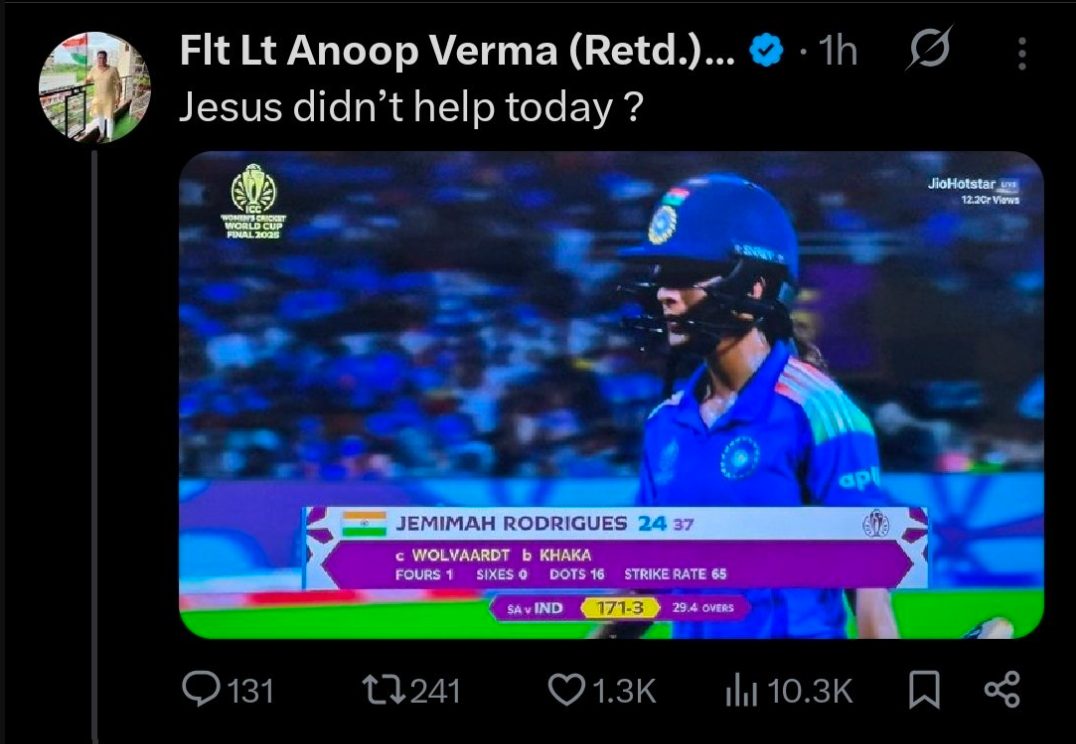Even as the country was celebrating India’s cricket World Cup triumph, the social media space saw a proliferation of rage-bait content through which a section of Hindutva flagbearers targeted Indian batter Jemimah Rodriguez for thanking Jesus Christ after her match-winning knock in the semi-final match against Australia.
What is Rage Bait?
Rage bait refers to content deliberately crafted to leverage a strong emotional reaction — most often anger or indignation — and thereby maximize engagement and ensure reward for the creator. The chronology is simple yet insidious: A post that evokes anger prompts one to react strongly. Reaction ensures engagement. More engagement means greater visibility and rewards from the platform.
A similar and perhaps more familiar concept is clickbait, which refers to content, typically a thumbnail or a headline, that evokes curiosity and entices the user to click on something.
Even if a user finds rage-bait content difficult to relate to, they cannot ignore it, typically because it creates a strong emotional response. This, in turn, forces them to engage, ensuring financial gains for the author. It is a business model that encashes outrage.
The spectrum of rage-bait content spans from seemingly innocuous videos of influencers like Winta Zesu, calling herself ‘incredibly beautiful’, to videos showing bizarre food concoctions, to videos of women answering basic general knowledge questions incorrectly to far more troubling content woven with communal and misogynistic undertones.
In targeting Jemimah Rodriguez over her faith, Right-wing users such as Chandan Kumar (@HPhobiaWatch) made perhaps the vilest possible use of rage bait. Readers should note that Kumar has a history of targeting women on the internet. Alt news has documented this in the past in detail.
On November 2, the day India won the Cup, @HPhobiaWatch shared a distorted image mocking Jemimah Rodrigues, accompanied by a caption sarcastically implying that Jesus was not with her this time. In the final, Jemimah scored 24 runs. The post is pinned to the user’s profile and has garnered around 3.2 million views, 13,000 likes, 2,700 comments, and 2,900 reposts at the time of this article being written. (Archive)

It is worth noting that the user also posted an image stating “wake up and ragebait like it’s your favourite breakfast” on November 3, 2025. (Archive)
Another X-account, @FltLtAnoopverma, whose bio claims that they are a retired Indian Air Force official, shared a picture of Jemimah Rodrigues, with a caption “Jesus didn’t help today?” – mocking her faith after her dismissal in the final.

The post received 10,300 views and was thereafter deleted.
The account made several such communal posts attacking Jemimah Rodrigues. The archives of those posts can be seen here, here, and here.
The propaganda handle, The Jaipur Dialogues (@JaipurDialogues), shared a similar post. It had a picture of Jemimah Rodrigues and in the caption, the user mocked her for her performance in the final match. “Being Sunday, Jesus is on holiday”, @JaipurDialogues wrote, alluding to Jemimah’s faith.
The post amassed around 327,300 views, 10,000 likes, 1,800 comments, and 2,200 reposts. (Archive)

The account went on posting and reposting such communal rage baits.
It is noteworthy that the user also shared an X post with a caption, “Rakh Vishwas, Tu hai Shiva ka Das!”, which, when translated to English, states, “Keep faith, you are a devotee of Shiva”. Women cricketers are seen in the post engaging in Hindu ceremonial practices. (Archive)
The contrast is quite striking. Rodrigues’ expression of her Christian faith and gratitude to Christ is ridiculed, while Hindu players engaging in religious rituals are celebrated. In fact, several cricketers who are Hindu by faith thanked their respective gods in post-match interviews. Jemimah was singled out because of her faith. That is, however, a different story.
Sanjay Dixit, the chairman of Jaipur Dialogues, also taunted Jemimah’s show of faith by writing, “What kind of Lord abandons its Australian children and makes a heathen team win? Abandoning 11 to gratify 1 – highly condemnable!” (Archive)

Several X users have shared similar problematic and communal posts. Many of them are examples of rage bait. See the gallery below:
Weaponisation of Rage Bait & the Abject Failure of X’s Policies
The communal digs at Rodrigues are not isolated incidents.
The Hindutva flagbearers, of whom @HPhobiaWatch is a prominent face, have done it all — from dehumanising the victims of the genocide in Gaza to ‘exposing’ Hindu women involved with Muslim men in India.
The use of rage bait by them is a strategy to ensure that these posts are not only amplified by their supporters but also by their detractors. People who find these posts offensive quote them or reply to them to express their indignation, leading to high traction. That, in turn, ensures a higher payout. According to X’s payout policy, which is something of a black hole, more verified users engaging with a post enables a higher payout.
It is crucial to keep in mind here that X verification, or the blue tick, which is the first step to get monetised on the platform, is now up for sale. This is a key change that the platform saw once Elon Musk took over as CEO. The badge — which was formerly a symbol of credibility and accountability that one had to apply for — can now be bought. This not only diminishes the whole point of ‘verification’, it also has the potential to mislead users who have habitually considered it as a mark of authenticity.
The cumulative effect of all this is a platform where one stands to gain financially by putting out hateful content.
This leads us to the obvious question — what corrective measures do the platforms have to address such hateful conduct? Under the ‘Hate or Extremist‘ subclause of X’s monetised content standards lies a vaguely worded elaboration. “Content that depicts or portrays hateful activity, harasses, shames, or insults an individual… on the basis of… religion…” is the characterization of this subclause. This includes ‘language with intent to demean, degrade or threaten, or intimate (sic)’ individuals belonging to a protected class.
In the context of the targeted harassment of Jemimah Rodrigues, the posts that we have documented above are clear cases of targeted hate based on religion.
Here lies the problem. More often than not, especially in India, hateful comments made on social media are laden with context. Users who regularly put out hateful content rarely use language that directly violates a platform’s policies or invites suspension. Instead, they work around the rules — employing historical references, communal tropes, and pejoratives. To a layperson, these remarks may appear innocuous, but they are often steeped in vile communal undertones. The ‘cauliflower farming‘ trope in this case is an example.
In fact, user @HPhobiaWatch has the phrase ‘cauliflower farmer’ written in their bio.
The total failure of X’s policies in this context is evident in the very existence of the posts targeting Jemimah. Despite the allusion to a genocide in their bio and the regular dissemination of hate speech and communal disinformation, a monthly subscription of Rs 356 (the basic cost of a blue tick) enables handles like @HPhobiaWatch to earn from the platform by doing exactly what X’s policies debar.
Again, under the ‘Slurs and Tropes‘ subclause of the Hateful Conduct policy, X prohibits targeting others with repeated slurs, tropes, or other content that intends to ‘degrade or reinforce negative or harmful stereotypes about a protected category’. A careful reading of the policy would tell us that none of the posts fall under this policy. Was a slur or trope used to direct communal hate at Rodrigues? No. Were harmful or negative stereotypes reinforced in her case? No. Was she mocked for following her faith nonetheless? Yes.
This not only proves policy failure beyond all doubts, it also raises the question whether the platform is at all interested in curbing such content. This is because more clicks — be that on any post — means more business for the platform itself as well.
The Politics of Rage Bait
It is also imperative to understand that the politics of hate — of which India has become an epicentre under the present regime — and the kind of dissemination of hate on social media that we have witnessed in the case of Jemimah Rodrigues, feed off each other. Violence against minorities has been normalised in the last decade to the point where they are no longer reported by the mainstream media in some cases. Muslims have borne the brunt of this most — be it cases of lynching or open calls for violence or bulldozer justice or cow vigilantism or threats of economic boycott. Christians have not been spared either. Missionary schools have been attacked on Christmas; nuns have been arrested on trumped-up charges, so on and so forth.
Such proliferation of communal hate in public life enables an atmosphere where users like @HPhobiaWatch and rage-bait content like the targeting of Jemimah thrive, and vice versa. It is no wonder that Chandan Kumar and his ilk are vocal supporters of BJP, the party that gains electorally from communal hate and openly uses communal polarization as a political tactic. BJP’s communal politics gave birth to these users and the hate amplified every day on social media by these users, in turn, benefits BJP.
X, meanwhile, remains a mute spectator.
Independent journalism that speaks truth to power and is free of corporate and political control is possible only when people start contributing towards the same. Please consider donating towards this endeavour to fight fake news and misinformation.




